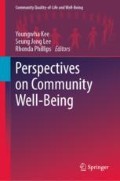Abstract
Local financial expenditures have been the subject of focused inspection in Korea. There is little research devoted specifically either to the self-accountability of local governments or to a residents-oriented expenditure system. This chapter, in the context of local financial accountability, is an effort to find a way to reorganize the role apportionment for community well-being and explore it from the fiscal structure perspective.
Access this chapter
Tax calculation will be finalised at checkout
Purchases are for personal use only
References
Alvarez-Diaz, A., Gonzalez, L., & Radcliff, B. (2010). The politics of happiness: On the political determinants of quality of life in the American states. The Journal of Politics, 72(3), 894
Babula, E., & Mrzyglod, U. (2013). Economic determinants of happiness among European nations. International Journal of Academic Research, 5(3), 519–524.
Choi, Y. C. (2008). Relationships between national competitiveness and decentralization, Korean Association of Local Government Studies Summer Conference Proceedings.
Cox, D., Frere, M., West, S., & Wiseman, J. (2010). Developing and using local community well-being Indicators: Learning from the experience of Community Indicators Victoria. Australian Journal of Social Issues, 45(1), Autumn.
Easterlin, R. A. (1974). Does economic growth improve the human lot? Some empirical evidence. In P. David & M. Reder (Eds.), Nations and households in economic growth: Essays in honour of Moses Abramovitz (pp. 89–125). Academic Press.
Forrest, R., & Kearns, A. (2001). Social cohesion, social capital and the neighbourhood. Urban Studies, 38(12), 2125–2143.
Han, S., Kim, H., Lee, E.-S., & Lee, H. S. (2013). The contextual and compositional associations of social capital and subjective happiness: A multilevel analysis from Seoul, South Korea. Journal of Happiness Studies, 14, 1183–1200.
Helliwell, J., Huang, H., & Wang, S. (2014). Social capital and well-being in times of crisis. Journal of Happiness Studies, 15, 145–162.
Hewitt, J. P. (1998). The myth of self-esteem: Finding happiness and solving problems in America. St: Martin’s Press.
Klein, C. (2013). Social capital or social cohesion: What matters for subjective well-being? Social Indicators Research, 110, 891–911.
Kraut, R. (1979). Two conceptions of happiness. The Philosophical Review, 167–197.
Lee, Y. K., & Dong K. K. (2007). A Study on the Quality of Life of Local Residents. Korean Policy Science Bulletin, 11(4), 223–250.
Lee, T. J., Park, C. M. & Song, K. S. (2005) Analysis of quality of life of local residents, Korean Local Government Review, 12(4), 75–92.
Leung, A., Kier, C., Fung, T., Fung, L., & Sproule, R. (2011). Searching for happiness: The importance of social capital. Journal of Happiness Studies, 12, 443–462.
OECD. (2014). How’s life in your region? Measuring regional and local well-being for policy making. Paris: OECD.
Putnam, R. D. (1993). The prosperous community: Social capital and public life. The American Prospect, 4(13), 1–11.
Rath, T., & Harter, J. (2010). Well-being-the five essential elements. New York: Gallup Press.
Soh, J. K. (1998) Definition of quality of life and its policy implications for urban policy, Regional Community Development Review, 23(1), 65–84.
White, S. (2008). But what is Well-being? In A framework for analysis in social and development policy and practice (pp. 3–7). University of Bradford.
Wiseman, J., & Brasher, K. (2008). Community well-being in an unwell World: Trends, challenges, and possibilities. Journal of Public Health Policy, 29(3), 353–366.
Acknowledgements
This work was supported by the National Research Foundation of Korea Grant funded by the Korean Government (NRF-2013S1A3A2054622).
Author information
Authors and Affiliations
Corresponding author
Editor information
Editors and Affiliations
Rights and permissions
Copyright information
© 2019 Springer Nature Switzerland AG
About this chapter
Cite this chapter
Oh, Y. (2019). Fiscal Structure and Residents’ Well-Being in Korea. In: Kee, Y., Lee, S., Phillips, R. (eds) Perspectives on Community Well-Being . Community Quality-of-Life and Well-Being. Springer, Cham. https://doi.org/10.1007/978-3-030-15115-7_9
Download citation
DOI: https://doi.org/10.1007/978-3-030-15115-7_9
Published:
Publisher Name: Springer, Cham
Print ISBN: 978-3-030-15114-0
Online ISBN: 978-3-030-15115-7
eBook Packages: Social SciencesSocial Sciences (R0)

